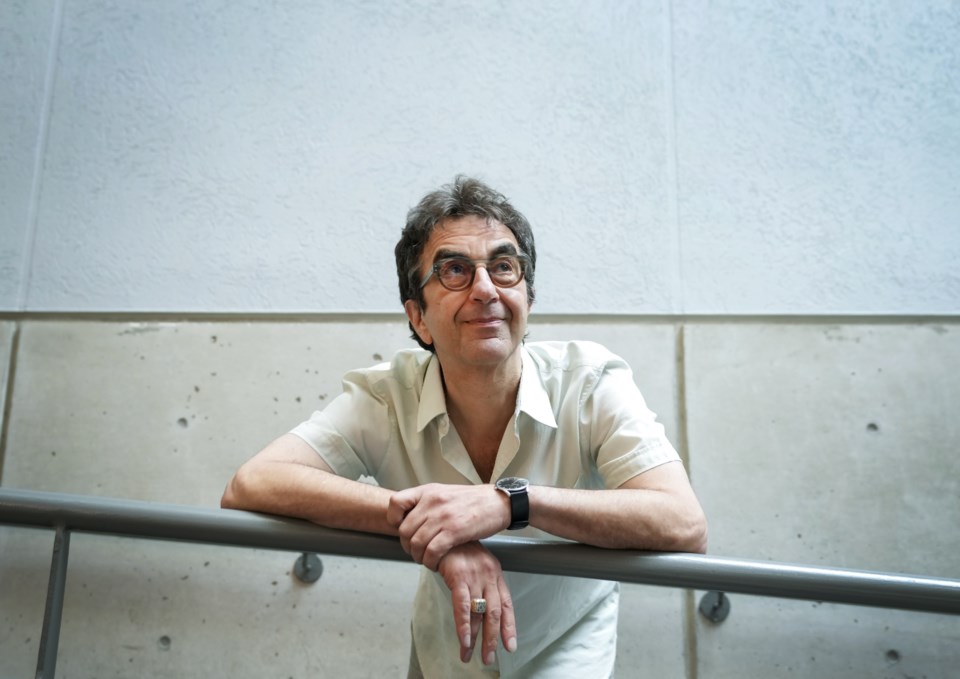TORONTO ‚Äî On a sun-drenched August morning, filmmaker Atom Egoyan stands in the silence of a dim post-production room. With his forthcoming feature "Seven Veils" casting rays from the theatre screen before him, he tweaks the final cut, perfecting what he can before itsToronto International Film Festival debut.¬Ý
‚ÄúThis is a super personal story,‚Äù says Egoyan of the psychological opera-inspired feature. ‚ÄúThis film is very related to my personal experiences and my hope is that everyone can take in this finished version.‚Äù¬Ý
"Seven Veils" stars Amanda Seyfried as a theatre director reworking a production of “Salome" after the death of her mentor who had previously been in charge. Over time, her world starts to unwind as her tormented past begins to bleed through her artistic interpretations of the play.
The film will premiere Friday as a collaboration with the Canadian Opera Company at the Four Seasons Centre for the Performing Arts.
Completing this film means a lot to Egoyan. During an interview at a downtown Toronto studio, he's explaining the roots of his passion for the project in between providing audio insert instructions to his team, and fielding incoming business calls in the pre-TIFF rush.
"Since mounting the biblical opera 'Salome' in 1996, which 'Seven Veils' is based on, I've come to realize that I've been haunted by its particular themes for some time,” says the 63-year-old, who was born in Cairo to Armenian parents and raised in British Columbia.
“The ways we reconfigure our own histories to suit our needs has come up often in my early films,” he adds, noting his own record of witnessing loved ones conceal troubled pasts and how it serves to fundamentally silence people.
‚ÄúSeven Veils‚Äù was filmed at the Four Seasons, the same venue where he directed ‚ÄúSalome‚Äù for the Canadian Opera Company. This connection has him reflecting on how he has overcome his own challenges in remounting the Oscar Wilde production, which depicts the beheading of Jochanaan (John the Baptist) at the behest of Jewish princess Salome.¬Ý
"The opera is the main work environment in my film,” says Egoyan. “It’s an environment I know really well.”
Since 1905, Richard Strauss's opera adaptation of the 1891 play has consistently sparked controversy, given the biblical crescendo of teenage Salome's striptease for stepfather Herod in exchange for John the Baptist's severed head.
Similar to the sequence of fragmented flashbacks that allude to an unusual connection between a father and daughter in "Seven Veils," Egoyan's 1996 opera production chose to portray scenes from Salome's childhood, insinuating instances of sexual assault. It‚Äôs a choice that raised concerns from prominent cultural critics of the time who felt violated by the imagery.¬Ý
‚ÄúThis was during a time before we had trigger warnings, so many weren‚Äôt prepared for what they would see,‚Äùsays Egoyan, who has directed the project for the stage four times since 1996.¬Ý
‚ÄúWhen I was given the chance to remount the play, I knew that I couldn‚Äôt present that same version ‚Äî it wasn‚Äôt responsible in today's culture, so in a way, I chronicled this process through Amanda‚Äôs character using the themes of that play which continue to haunt me.¬Ý
“Here you have a woman in 'Seven Veils,' dealing with her abusive, suppressed history as she directs this play and it’s the kind of scenario I’ve always been drawn to…how those in power, similar to parents, can work to reconfigure and bury our histories."
Egoyan acknowledges that concealed wounds have been the connective tissue defining his early filmography, the most notable being his celebrated 1997 Oscar-nominated film "The Sweet Hereafter," starring Sarah Polley, which explores the aftermath of a small-town bus accident and an underbelly of sexual abuse.
It’s a situation the director says he’s navigated firsthand, drawing from a relationship he had in his teenage years.
“I gradually came to discover that she was being abused by her father,” says Egoyan of his first love. “No one talked about it and she certainly wasn’t talking or trying to think about it.
‚ÄúI tried to understand things through her behaviour‚Ķand the dynamics of what felt unknown and reconfigured by her parents fascinated me ‚Äî and in some ways, haunted me.‚Äù¬Ý
Interwoven throughout “Seven Veils” are the faint flashbacks of the main character's father, as well as current-day issues of sexual harassment and how bureaucracy works to camouflage victims.
‚ÄúSeven Veils,‚Äù he says, is another avenue to explore the complexities of what often lurks behind our veiled surfaces. It‚Äôs a concepthe also explores in the 1994 psychological drama ‚ÄúExotica,‚Äù and 2009's erotic thriller ‚ÄúChloe," which alsostarredSeyfried.¬Ý
Though he considers the stories he‚Äôs told over the years in front of the camera to have been inspired by both life and art, he‚Äôs often wondered if they were his to tell.¬Ý
‚ÄúI feel we have to trust artists to deal with experiences that may not be entirely their own, and we‚Äôre living in a time when people are rightfully questioning who has the right to tell certain stories,‚Äù says Egoyan.¬Ý
“But I’m aware of that and while I’ve been influenced by great acts of art, they’ve been great acts of appropriation and I’m still sorting through these feelings which is a balance I’m still negotiating.”
In other words, Egoyan acknowledges that every narrative he has recounted or transformed, whether derived from a 19th-century opera or an incident he personally witnessed, merits a discussion regarding ownership.
“I think a lot of really important art has been done by people who are looking at that process and feeling enough empathy to tell those stories. Trauma is a strange universal thing…we’ve all had to deal with it whether we remember it or not.”
This report by The Canadian Press was first published Sept. 5, 2023.
Noel Ransome, The Canadian Press




